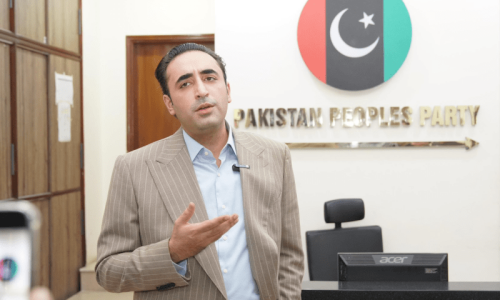BAGHDAD, Sept 24: Eight telecom employees became the latest victims of Iraq's kidnapping epidemic, as Prime Minister Iyad Allawi insisted on Friday that the country remained on target for January polls despite US warnings that violence could continue.
The fate of British engineer Kenneth Bigley, the sole surviving member of a trio of Western hostages threatened with death, remained unknown, as did that of two Italian women aid workers seized earlier this month.
In the latest bloodshed in the capital, three people were killed and 14 wounded in an explosion in a central Baghdad square, medics said. The cause of the blast was not immediately clear.
The blast was in front of a restaurant and a court house on the east bank of the Tigris which flows through the capital. Two Egyptian engineers named as Mustafa Abdel Latif and Mahmud Turki, working for Egypt's telecom giant Orascom, were snatched at gunpoint from their central Baghdad office on Thursday night, an interior ministry spokesman said.
Six other employees of the company - four Egyptians and two Iraqis - were seized near the troubled Syrian border town of Qaim on Wednesday, an expatriate employee of the company told AFP.
Cairo also confirmed the abduction of those four nationals. The Egyptian mission in Baghdad was in touch with "different circles with which it has strong ties in order to guarantee the release of the Egyptian hostages," a statement released in Cairo said.
The abductions were the latest in close to 150 kidnappings of foreigners reported in Iraq since April 2004. At least two Egyptian hostages have been executed in recent weeks and two others released.
A video of the 62-year-old Bigley pleading with British Prime Minister Tony Blair to meet his Al Qaeda-linked captors' demands for the release of Iraqi women prisoners was aired on Thursday but there was still no word on the Englishman's fate.
A group of Iraqis started distributing 50,000 pamphlets with Bigley's picture in the upmarket Mansur neighbourhood of Baghdad where he was kidnapped last week, together with two US colleagues.
The Unity and Holy War group of alleged Al Qaeda operative Abu Mussab al-Zarqawi - the most wanted man in Iraq - already beheaded the two Americans after the coalition refused to release the two Iraqi women it detains.
US artillery and aircraft pounded southern sectors of the Sunni Arab insurgent enclave of Fallujah, residents said. The military confirmed it had fired artillery at suspected insurgents but said there were no air strikes.
The US military has intensified strikes on Fallujah this month, targeting alleged hideouts of Zarqawi. The city poses the most serious obstacle to the holding of nationwide elections as planned in January, but the US-backed prime minister was adamant during meetings with US officials in Washington said on Thursday that the vote would go ahead as planned.
"I know that some have speculated, even doubted, whether this date can be met," Allawi told US lawmakers. "So let me be absolutely clear. Elections will occur in Iraq on time."
US President George W. Bush acknowledged that "terrorist violence may well escalate as the January elections draw near" and cautioned the Iraqi government and its allies against lowering their guard. But Defence Secretary Donald Rumsfeld spelled out US misgivings about the possibility of nation wide polls as soon as January. "Let's say you tried to have an election and you could have it in three-quarters or four-fifths of the country but some places you couldn't, because the violence was too great. Well, so be it."
US officials in Baghdad have said that contingency plans exist to defer the polls in the Sunni-dominated province of Al-Anbar, west of Baghdad, where insurgents effectively control some of the bigger population centres.
Sheikh Abdulsalam Qubaisi, a leading Sunni scholar in Iraq, called on the Americans to leave and slammed Allawi as "a small bit of scum fighting the current, calling America a liberator and friend." He also urged the Iraqi national guard to disobey orders. -AFP













































Dear visitor, the comments section is undergoing an overhaul and will return soon.